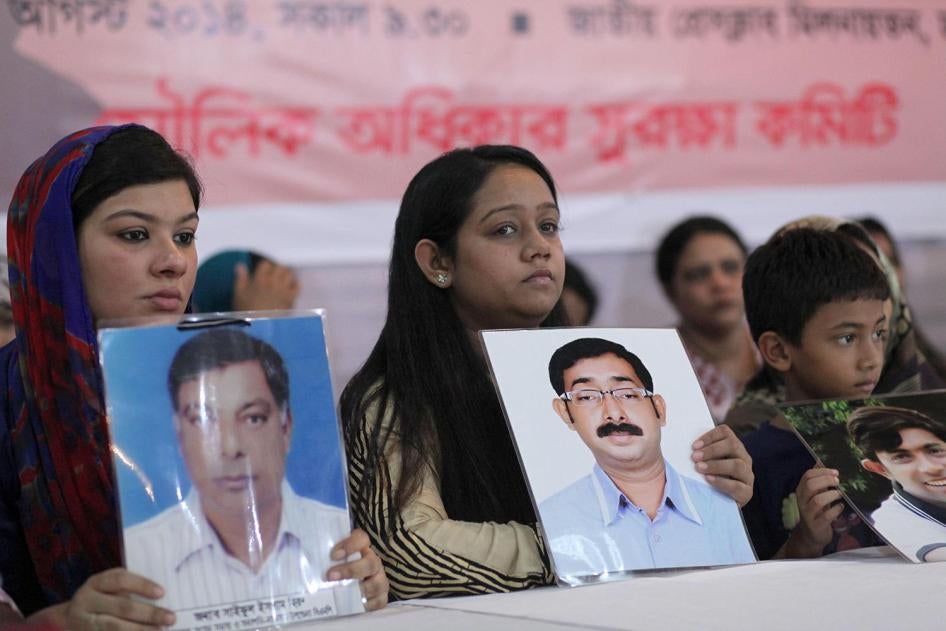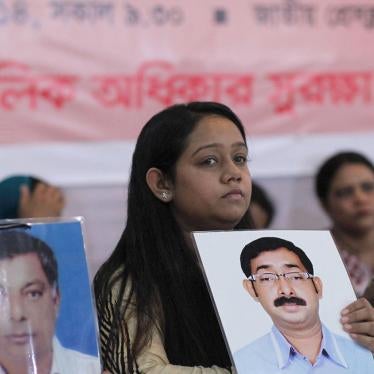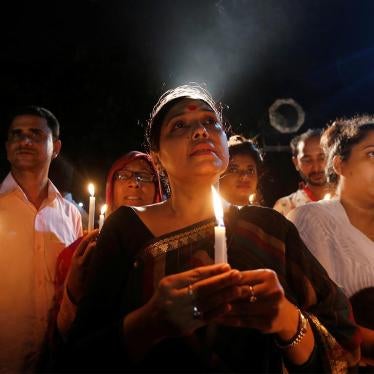People are increasingly disappearing into government custody in Bangladesh. Government authorities staunchly deny these allegations, despite credible accounts from witnesses who saw government agents take the victims away. Families of the disappeared, desperately looking for answers, hold vigils in Dhaka. They wait for hours outside the offices of various security agencies, often turned away with dismissive denials.
Bangladesh recently agreed to participate in a review of its practices by the United Nations Committee against Torture for the first time since ratifying the Convention against Torture over 20 years ago. When the committee rightly pressed Bangladesh to put an end to the increasing cases of enforced disappearances by law enforcement officials and asked about torture allegations consistently documented by human rights groups, the government repeated its surreal talking-points, denying what has become a blatant reality. “We do not agree to the proposition that enforced disappearances occur in Bangladesh frequently,” Law Minister Anisul Huq told the committee.
Instead, Huq claimed that “there has been a tendency for quite some time to label all cases of missing [persons] with enforced disappearances. This is done with the obvious intention of maligning the government and its achievements.”
The international community has no incentive to malign the achievements of the government of Bangladesh, only to hold it accountable to universal human rights standards and its own international commitments. On August 10, the Committee against Torture released its concluding observations outlining specific recommendations for Bangladesh including publishing a list of all recognized detention sites, allowing representatives of non-government organizations and an independent body to make unannounced visits to these sites and allowing them to speak confidentially with any individuals in the facility. The committee also called for independent and thorough investigations of all disappearances and prosecution and punishment of officials found responsible.
Sadly, that may not happen. When Prime Minister Sheikh Hasina came to power in 2009, she promised to bring an end to human rights abuses. But instead, Bangladesh authorities have nearly free rein, arbitrarily detaining the opposition and her critics with impunity. In many cases, victims remain in custody — often in secret detention centers — for weeks or months before being formally charged or released. Others are killed in what the government claims are “armed exchanges,” and many remain disappeared.
Enforced disappearances in Bangladesh have actually increased since the passage of the 2013 Torture and Custodial Death (Prevention) Act.
Law Minister Huq said that under Bangladesh law, all police officers are required to lodge all cases of abduction. In reality, the police often do not allow families to file complaints in cases in which law enforcement authorities pick up their relatives.
For example, on December 4, 2013, at least three witnesses saw officers of the Rapid Action Battalion (RAB) pick up Sajedul Islam Sumon, a well-known local leader of the opposition Bangladesh National Party (BNP), and five other men. But when the family went to the local police station to file a complaint, the duty officer refused to file a case naming the RAB.
Since then Sumon’s family members say they have filed least 13 written complaints to the RAB, and five to other government authorities, including the Home Ministry, police, and military intelligence. The family has also made a complaint to the National Human Rights Commission and filed a habeas corpus petition in court. Despite these exhaustive efforts they have been given no further clarity on what happened to Sumon.
On April 9, Michael Chakma, an indigenous rights activist, disappeared on his way to Dhaka and has not been seen since by his family and friends. On May 21 the High Court asked the Home Ministry to submit a report on the progress of investigation within five weeks. There has been no response.
Huq cited two cases in which victims “reappeared,” both of them prominent BNP leaders.
Humam Chowdhury was pulled out of his car while traveling with his mother to a courthouse to attend a hearing on an ongoing matter on August 4, 2016. His mother said Humam was detained by law enforcement officials, but when she tried to file a complaint, the police said they would need permission “from above” to accept the report. Nearly seven months later, on March 2, 2017, following a statement by the UN Working Group on Enforced or Involuntary Disappearances, Humam was released blindfolded and disoriented on the roadside, close to his family home in Dhaka.
Salahuddin Ahmed was handcuffed and taken away by men identifying themselves as belonging to the Detective Branch of the police on the evening of March 10, 2015, according to an eyewitness. The police denied any involvement. Following international pressure, about two months later, Ahmed was found in India so disoriented that locals first brought him to a psychiatric facility.
The fact that the men were later found “proves the so-called allegation of enforced disappearance false,” Huq claimed. But a forced disappearance is the deprivation of liberty by agents of the state, and a subsequent refusal by the state to acknowledge the person’s whereabouts or fate — regardless of whether and how they turn up latter. The issue is where these men were in the meantime and what happened to them, something the authorities have failed to investigate.
Instead of feigning ignorance to the horrific experiences these men — and hundreds of others — have endured at the hands of Bangladesh’s security forces, the government should take responsibility and start abiding by the rule of law that they claim to uphold.










